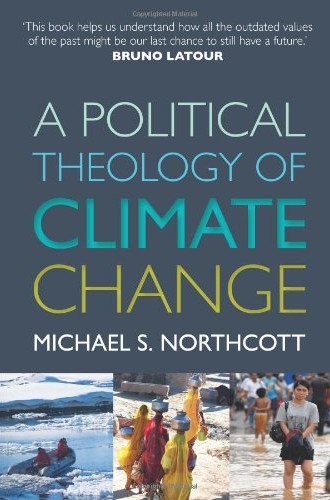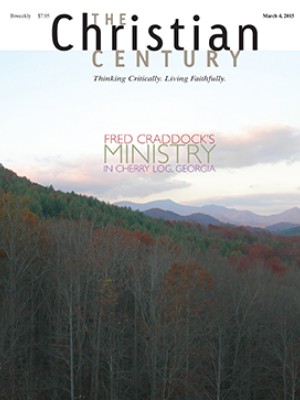A Political Theology of Climate Change, by Michael S. Northcott
Imagine the homes and cities of nearly half of the world’s population under water; the Amazon rainforest turned into a desert; and most of the western United States, Mexico, North and South Africa, southern Europe, and Australia rendered uninhabitable and useless for agriculture. This is not the background of the latest Hollywood blockbuster, but a collection of predictions shared by many climate scientists and discussed in a major World Bank report titled Turn Down the Heat, published in 2012.
Given the contested nature of climate change science in the United States and the deeply politicized nature of related public policy, many Americans dismiss these reports as sensationalized attempts at fearmongering. Christian ethicist Michael Northcott sees the use of apocalyptic imagery in the climate debate very differently.
Read our latest issue or browse back issues.
Northcott highlights how “climate apocalyptic” serves three functions similar to those of New Testament apocalyptic. First, it unveils or demonstrates the ways in which humanity’s actions are influencing and reshaping the natural world. Second, it warns that although changes in the planet and its atmosphere may have a disproportionately damaging impact on the world’s poor and the marginalized, they will also harm the world’s elite. Third, it is a call and an opportunity for moral and political transformation.
Northcott’s starting point is the profoundly political reaction to the scientific consensus on climate change. He argues that this political reaction is due to the fact that the scientific evidence regarding the causes of climate change points clearly to industrial economies’ dependence on fossil fuels as the primary culprit. He remarks that climate scientists have been surprised to find themselves accused of “anti-capitalism, corruption, fraud, perfidy, and selfishness” in political attempts to discredit their findings.
These attempts to discredit the climate scientists and challenge the anthropogenic origin of climate change are funded largely by energy companies and others who hold a deep financial stake in the continued maintenance and growth of industrial capitalism. Given that trillions of dollars in fossil fuel reserves of oil companies currently show up on the balance sheets of corporations and investment portfolios across the world, the morally necessary decision to leave those remaining fuels in the ground would undoubtedly wreak havoc on the global economy.
Northcott argues that impending climate change poses an apocalyptic moment of judgment on the present form of fossil-fueled consumerist civilization. This claim is made terrifyingly ominous by climate scientists’ estimation that the 4 degree Celsius (7.2 degree Fahrenheit) rise in temperature that would prompt a radical reshaping of the planet will arrive by 2070. No wonder my 14-year-old daughter, like many teens and young adults, is obsessed with the dystopian literature and films that currently permeate popular culture. Young people fear that this will be their future and that their generation will have to figure out how to pick up the pieces of a world that is falling apart on our watch.
In 1992, on the eve of the world’s first Earth Summit in Rio de Janeiro, then president George H. W. Bush famously declared: “The American way of life is not up for negotiation. Period.” This determination not to make lifestyle changes is widely shared not only by many Americans, but by people living in developed countries who have designed their lives, livelihoods, and communities around a deep and abiding dependence on fossil fuel.
This dependence is not limited to the developed world. It is being exported to the Global South, where countries are encouraged to develop industrial economies as the path toward human flourishing.
Among government officials and economists who acknowledge the threats posed by climate change, the political debate tends to focus on the relative merits of carbon taxes versus cap-and-trade policies, or on how to capture and bury emitted carbon dioxide. Debates about how to mitigate the damage of fossil fuels sidestep the more fundamental question of whether we should continue to use them and how we can create viable national and international plans that transition us to social, cultural, and economic models that are not dependent on fossil fuels. The debates over mitigation also divert the public’s attention from deeper ethical questions about how we are ordering our lives in the 21st century.
Northcott’s book examines the ways in which our philosophical orientation toward self, others, and the divine shapes our worldviews and how these worldviews shape our perceptions of the crisis and our response to it. The neoliberal worldview that underlies and supports industrial economic development is a logical extension of the Enlightenment attitude that humans are free to shape the world and our destiny as we see fit. Northcott argues that the belief that we as humans control our own destiny and future is a theological flaw that must be overcome.
Given the interdependence of the natural world, mitigating climate change must be a planetary enterprise. The only course of action that will save the planet and not merely retain a place for postapocalyptic human survivalism is for us to overcome our current Enlightenment-inspired cultural narrative of human domination and control and listen to the wisdom of the natural world alongside the wisdom of the sacred traditions of Christianity—including covenant theology, justice in distribution of the fruits of the earth, respect for ecological limits, and attention to asceticism. This sort of paradigm shift will require the development of new narratives that can reshape our cultural, religious, and social understanding of our relationship with nature from one of control to one of partnership.
Northcott does a better job at demonstrating the nature and scope of the problem and analyzing the intellectual history and politics of the climate crisis than he does at offering a path forward, but he does end the book with a discussion of the Transition Movement, which focuses on the necessity of working together in communities of resistance and solidarity to build alternative economies and social structures that are consistent with continued human life on the planet. Regardless of how much we humans neglect our sacred duty to care for God’s creation, the creation will survive our folly. The question is whether we will be able to honor the gift of God’s wisdom, given to us in the form of the imago Dei, and reimagine our understanding of human flourishing in ways that reflect our interdependence with the rest of creation.






